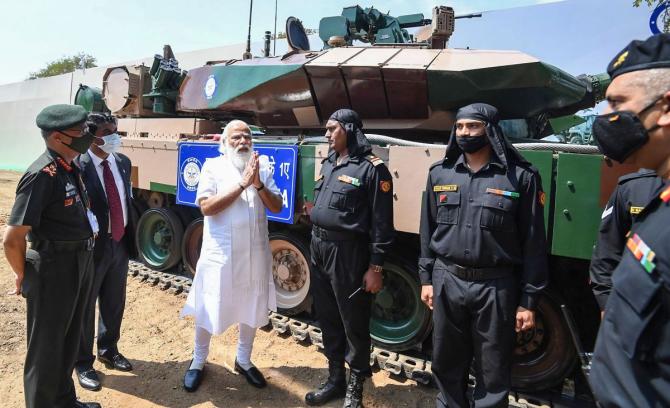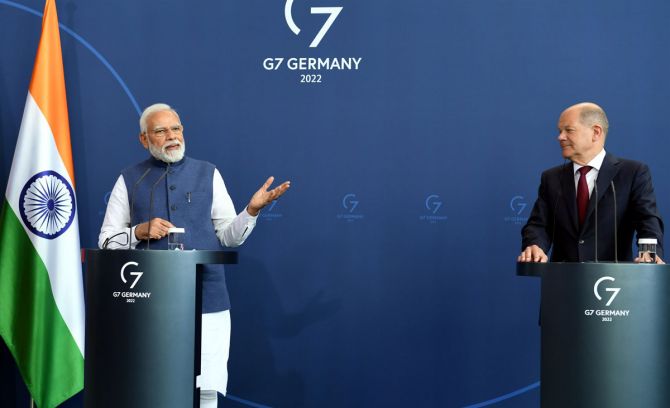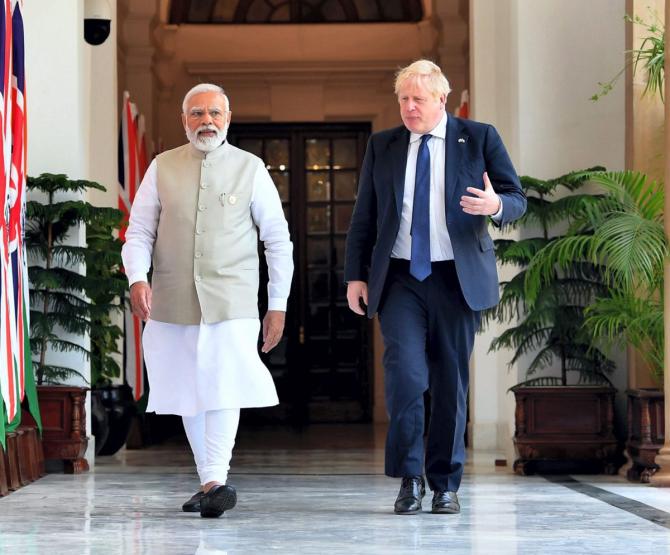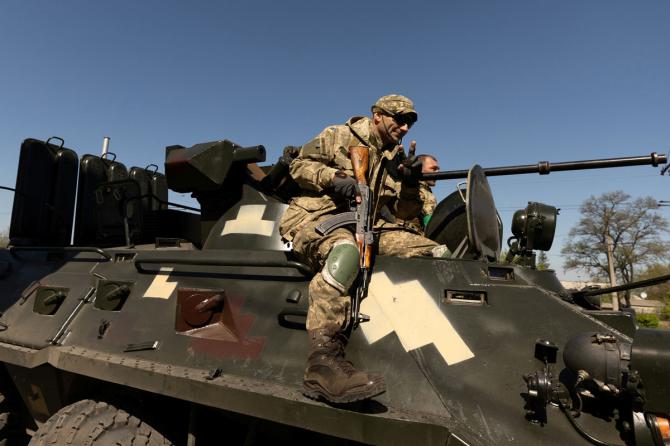From: Bharat Karnad
A 2-part interview in Rediff News published on May 19 & May 20
Part 1
‘The US will not want to tangle with China landwards.’
‘Nor will the US confront the Chinese navy seawards on India’s account.’

IMAGE: External Affairs Minister Subrahmanyam Jaishankar and Defence Minister Rajnath Singh at a joint news conference with United States Secretary of State Antony J Blinken and Defence Secretary Lloyd Austin III after the fourth India-US 2+2 Ministerial Dialogue at the US State Department in Washington, DC. Photograph: Michael A McCoy/Pool via Reuters
Dr Bharat Karnad, the national security expert at the Centre for Policy Research, the New Delhi-based think-tank, believes the time has come for the Narendra Damodardas Modi government to draw up a strategic non-aligned policy to suit India’s interests.
“India, its government, and Indians, generally, will have to get out of the debilitating habit of mind of expecting some big power to come to its aid and fight its wars,” Dr Karnad tells Rediff.com Senior Contributor Rashme Sehgal in the first of a two-part interview:
Home Minister Amit Shah said at a book launch in New Delhi on May 11 that Prime Minister Modi has transformed India’s foreign policy and made it subordinate to India’s defence and security interests.
This is true, especially in light of the Ukraine developments when the Modi government successfully resisted the relentless pressure the US and West European States, in particular, put on New Delhi to sever India’s arms and energy supply lines to Russia.
In the ongoing Russia-Ukraine war, has India’s tight rope walking between looking after its interests vis a vis Russia without displeasing the US been a success? In the event of a Chinese attack in the future, will the US come to our rescue?
What about Home Minister Shah’s statement made on May 5 where he spoke about India reclaiming Pakistan occupied Kashmir?
India, its government, and Indians, generally, will have to get out of the debilitating habit of mind of expecting some big power to come to its aid and fight its wars.
- That has never happened in the past and will not in the future — no matter what is at stake.
The US will not, in particular, want to tangle with China landwards — a policy inhibition nursed from the Korean War (1950-1953) when the US-led Allied forces suffered grievous losses and were pushed by the PLA back down to the 39th Parallel where the lines stabilised on the present North Korea-South Korea border.
Nor will the US confront the Chinese navy seawards on India’s account.
Washington may, however, channel real time intelligence, etc and do things that do not in any way involve American ‘boots on the ground’.
The aggressive ‘recovery of Pakistan occupied Kashmir’ issue raised by the Modi regime seems to be more a provincial and national political ploy to keep Pakistan and the domestic Opposition on the defensive, primarily because militarily it is a difficult goal to achieve what with Chinese strategic interests being directly engaged with the Belt and Road Initiative-related ‘China-Pakistan economic corridor’.
There is an equally strong possibility that with Russia’s increasing dependence on the Chinese, the Russians will also not come to our help in case of a Chinese attack.
Russia will not come to India’s direct assistance either.
It, in any case, will have enough on its hands for the next few decades by way of reconstructing its own economy (sans revenues worth some 300 million euros a day from export of oil and gas to Germany and other European States) and that of the Donbas region of eastern Ukraine it will annex.
As far as the Russia-China nexus goes, Moscow is no strategic fool.
It is mindful of not being a cog in China’s hegemonic designs and is as wary of potential territorial inroads by China in mineral rich eastern Siberia as India is about a Chinese imperium in Asia and the PLA occupying Indian land in Ladakh and elsewhere.

IMAGE: Prime Minister Narendra Damodardas Modi hands over the indigenously developed Arjun Main Battle Tank (Mark 1A) tanks to the Indian Army in Chennai. Photograph: PTI Photo
A perception that has gained ground as a consequence of the Russia-Ukraine war is that Russian weaponry has not proved to be all that good and therefore demand for it will be reduced in the future.
Do you see that happening in the case of India which remains heavily dependent on Russia for arms supplies?
All weapons systems end up performing less than as advertised in brochures and by arms salesmen.
That said, yes, the Ukrainian partisans have revealed a major design flaw, for instance, in the T-72 main battle tank — the wrong placement of the ammo storage compartment under the crew cupola, which tends to blow up with the first guided anti-tank munition hit midship.
It is a matter of grave concern to the Indian armoured forces featuring the T-72.
Maybe, this will finally convince the armoured brass in the directorate in army headquarters to take ownership of the indigenous Arjun MBT (which handily beat the Russian T-90 and T-72 tanks in test trials in all weather, all conditions, all terrains!), and to buy this Indian combat vehicle in bulk and invest fully in its further improvement.
On the other hand, the Su-30MKI air superiority fighter and the MiG-29 for air defence have no peers.
But even these renowned planes pale in many performance aspects to the home-grown Tejas 1A! If the Ukraine crisis proves anything it is for the Indian military to ‘Buy Indian’ so that Prime Minister Modi’s laudable atmanirbharta mantra does not remain mere rhetoric.
I ask this question in the context that in a recent article, you have very caustically mentioned how the 2008 India-US civilian nuclear cooperation agreement which was supposed to deliver ‘20,000 MW by 2020’ and the 2012 Defence Technology and Trade Initiative to transfer advanced military technologies and high-value tech collaboration have hardly delivered.
The only important joint project to-date involving US assistance for developing a combat aircraft jet engine in India was called off by President Trump.
Why does the US have reservations in providing advanced equipment and technology transfer to India given that we are a member of QUAD?
The fact is the US does not like to share its top-end technology with anyone, including its closest allies, because it perceives it as the US military’s edge in battle.
For example, the United Kingdom — America’s closest, most intimate, ally invested several billion dollars in the development of the multi-role Lockheed F-35 combat aircraft and expected a wholesale transfer of its technology. But once F-35 got into production stage, Washington refused to pass on source codes for the software driving the onboard avionics.
So, what chance, do you think, India has in securing really high military technology?
Part 2
‘This may indeed be India’s moment’
May 20, 2022 09:30 ISTGet Rediff News in your Inbox:email
‘For the first time, all major countries are discovering India’s indispensability to their own foreign policy interests.’

IMAGE: Prime Minister Narendra Damodardas Modi and German Chancellor Olaf Scholz at the federal chancellery in Berlin, May 2, 2022. Photograph: Press Information Bureau
Dr Bharat Karnad, the national security expert at the Centre for Policy Research, the New Delhi-based think-tank, believes the time has come for the Narendra Damodardas Modi government to draw up a strategic non-aligned policy to suit India’s interests.
“Despite being stonewalled by New Delhi on the Ukraine issue, the US, NATO States, Japan, Russia, and even China want India as their ‘best friend’ as British Prime Minister Boris Johnson said during his recent visit,” Dr Karnad tells Rediff.com Senior Contributor Rashme Sehgal in the concluding segment of a two-part interview:
You have argued that America and the European Union need India to ring fence China. Considering our close economic dependence on China, is that feasible?
Get the facts right! India does not depend on China for anything that cannot be bought from other sources.
It is China that depends on India’s vast consumer market to keep its industry in clover — the reason why the Modi government has to begin seriously limiting Chinese access to the Indian market.
Even as Indian companies operate under severe regulatory strain in China, Chinese companies are afforded full freedom by the Indian government to mint money, selling all manner of manufactures to Indians.
It is time the Modi regime wised up and did something meaningful to hurt China economically by simply evening out the economic playing field. Is that too much to ask?
Does being non aligned prevent India from evolving a strategic foreign policy to suit its own interests?
The Modi government says since India is being wooed by several foreign nations and this is ‘India’s moment’.
Goes without saying that being non-aligned increases India’s options and policy choices.
Good that the Modi government discovered the merits of this stance, even if a little belatedly.
This may indeed be ‘India’s moment’ because for the first time all major countries are discovering India’s indispensability to their own foreign policy interests.
This is why despite being stonewalled by New Delhi on the Ukraine issue, the US, NATO States, Japan, Russia, and even China want India as their ‘best friend’ as British Prime Minister Boris Johnson said during his recent visit.

IMAGE: Prime Minister Modi and British Prime Minister Boris Johnson at Hyderabad House in New Delhi, April 22, 2022. Photograph: Press Information Bureau
Do we have the economic muscle to hard talk the US, China and the EU given that our economic parameters are showing a downward slide?
India, because of its vast market, packs an economic wallop.
Ironically, it is the Indian government and trade and commerce ministry, in particular, that refuses to drive hard bargains, time and again succumbing to external pressures and to the institutional desire to be ‘responsible’ and hew to the World Trade Organisation and other norms even when no major power does that.
For evidence, look at all the unrestrained and unfavourable Free Trade Agreements the government has signed with all and sundry in recent years.

IMAGE: Ukrainian soldiers ride an armored vehicle en route to the front in the Donetsk region. Photograph: Jorge Silva/Reuters
How would you evaluate India’s foreign policy especially in its handling of the Russia-Ukraine conflict?
The Modi government has achieved stellar success with its Russia-Ukraine policy — warding off Western pressure with ease while, even if for form’s sake, upbraiding Moscow for the invasion excesses, and otherwise managing to maintain a ‘balance’ between the feuding parties.
Do you see the ongoing crisis in Sri Lanka impacting us in any way?
Hard to take pleasure from a neighbour’s dive into despond. But the ruling Rajapaksa family has been a pain in India’s butt.
The current Sri Lanka president, Gotabaya Rajapaksa, in particular, having it in for India for its support to the secessionist Liberation Tigers of the Tamil Eelam which he as defence minister ruthlessly crushed in the bloodiest of civil wars.
The good thing for India is that Gotabaya Rajapaksa having pushed his country wilfully into a nepotistic form of government in which family members held all the high ranks and wielded all the levers of power, and worse into a ‘debt trap’ laid by China and into bankcruptcy, all political parties in Sri Lanka including the ruling Sri Lanka Freedom Party, are agreed that Colombo has to change course.
Here Modi’s far-seeing policy of opening multi-billion dollar lines of credit for Sri Lanka to use to offtake Indian commodities and consumer items to meet shortages and quell popular unrest, will help in getting India-Sri Lanka relations back on track.
https://www.rediff.com/news/interview/dr-bharat-karnad-this-may-indeed-be-indias-moment/20220520.htm
Permalink : ‘Don’t Expect US Help In A War With China’
